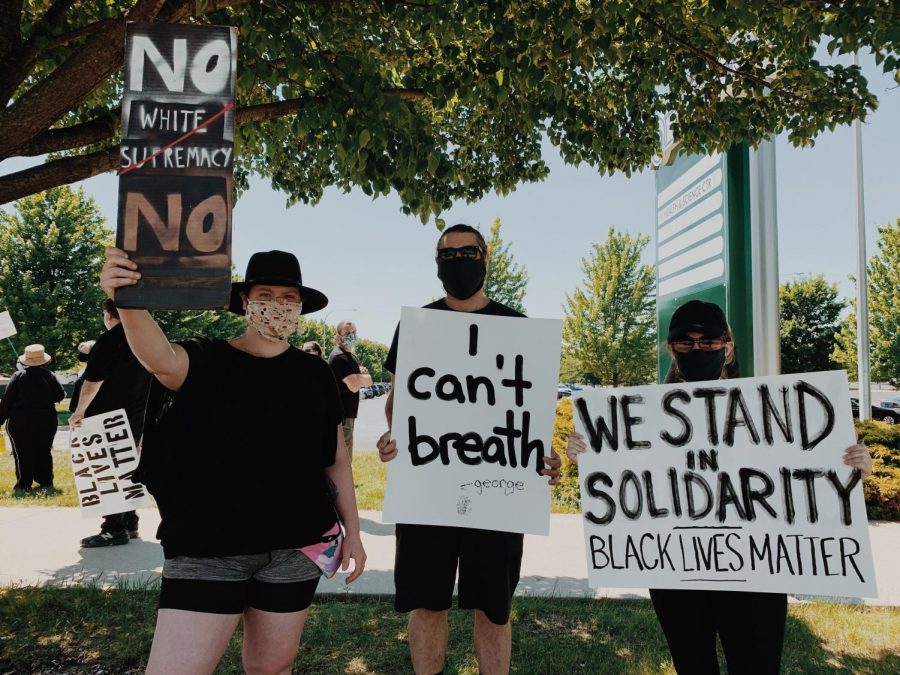Silent march for Black Lives Matter on the COD Campus
June 8, 2020
• Editors’s note: This article was updated on June 9 to reflect Tauya Frost as the coordinator of the silent march.
As masses of people continue to gather throughout the world in the name of Black Lives Matter, College of DuPage participated in the movement, as well, for its first in-person, campus-wide event since the recent pandemic canceled all forms of contact this past spring. Unlike most of the protests and rallies that have been streamed in the media, COD instead commemorated George Floyd and the movement, as a whole, in a silent, yet powerful manner on Sunday, June 7th. By dedicating 8 minutes and 46 seconds of silence, the participants were able to use that time for reflection, while also considering the slow killing of George Floyd, at the hands of a Minneapolis police officer on May 25, 2020.
The event was scheduled by faculty, in an effort to reconnect as a community and bring to light an issue that has continued to face the nation. This event was open to the public, beyond just the college faculty and students. By creating this environment, it allowed for the momentum to continue growing, as people were encouraged to bring their family and friends along.
COD Faculty Association President Shannon Toler took part in organizing the event, alongside event coordinator, Tauya Forst. They decided to host this event so the issue was confronted on campus in a socially distanced way, with close consideration of the COVID-19 crisis that persists across the world. Toler believed the event to be essential, she explained, recognizing that, as educators, she and the rest of the COD faculty must be committed to empowering their students and people beyond the classroom to be great citizens.
“We [faculty] stand ready to learn, we stand ready to get better—because I think that we all know we can all do better,” Toler said. “So, this is the first of many steps that I think are coming from all COD faculty.”
Toler described the most effective environment for understanding the movement is setting up places to simply listen. “We must set up places where we are all comfortable listening, and in a place where we don’t take listening as criticism,” she continued, “but understanding that we are all trying to learn and get better. I think back about this idea of continuous improvement.” Implementing this event within the COD community created the first step towards awareness of the issue, as she described.
Along with creating places for listening to the voices that have been silenced in regards to racism and police brutality, Toler explained there must be a certain understanding within such communities. This understanding is the recognition of privilege within certain groups that others may have never experienced simply because of the color of their skin.
“I also think that we know that at the root of a lot of these issues is privilege,” she continued. “I think that as faculty we need to think about how privilege plays out in our classrooms and how privilege plays out on our campus. What can we do to support a more equitable distribution of privilege? We must figure out how, as faculty, we can share our privilege in a better way with our students and with our colleagues. This is a campuswide consideration.”
Similarly, College of DuPage President Brian Caputo voiced in his public statement last week that there needs to be recognition within the current standing of our nation. “The only way to deal with racism is by recognizing its existence and educating people on the importance of equity and inclusion. A multicultural society will enrich all of our lives by opening us up to new ideas that broaden our ability to understand and accept one another,” Caputo said.
The solution goes beyond just being anti-racist and being aware of tolerance. Many have already done that. Toler said it needs to go a step further.
“I think that this is where some deep thought and deep consideration needs to come from,” she said, “we are becoming inspired to think differently. Some of us can look at this as we keep spinning our wheels, and we keep doing the same things, but how are we going to make it different this time?”


















